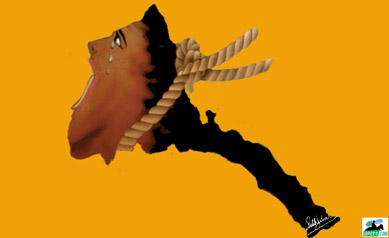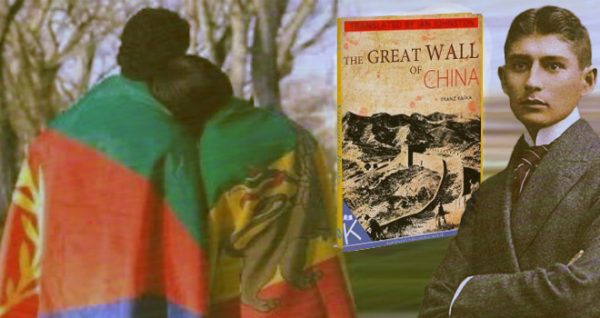“Mistir Leyti”: Secret of The Night

During the struggle (Ghedli), the Tigrinya phrase for “password” was “misTir Leyti”: secret of the night. Usually, it was the name of a martyr, shared and circulated per whisper up to the tegadalay (combatant) serving in the frontline. Practiced throughout the whole Liberation Front and renewed on a daily basis, it was crucial for the survival of a military unit, especially during the night. It served to identify a comrade and rule out any risk of an intruder or enemy respectively. When darkness falls, the first thing you would ask any suspected moving person is “dew bel, men iKa, … mistir leyti!” (Halt, who are you, name the password!) If the person in question cannot immediately render a correct response, he would be in serious trouble. So, you memorize it. The guards in charge for the night shift (Hares) are assigned alternately.
Since I never liked to be woken up in the middle of the night, I always preferred to be the first or the last Hares (guard), though it was common knowledge that the risk level of the last guard was high, since the probability of a dawn raid was significant. Maybe I was so young and naive to bother about or realize the level of danger. As the youngest in my unit, my comrades granted me this privilege. Our ganta (unit) used to sleep in one of the strategically best-situated hidmos (traditional dwelling) at the top of the village. The owner was an elderly woman whose home was now continuously inhabited by us. She slept in the wiShate (interior) and made the other parts of her house available to us. In the late evenings, it was customary to end up sitting in convivial gatherings chatting and cracking jokes, Hikiyatat. Some the jokes could be equated to soft porn. Whilst most of our male comrades obviously enjoyed them, we, the two female tegadelti (combatants), were either bored or made our objections known. Thus they would occasionally cut it off. If our objection was not heeded, we would ignore and evade further discussion, and simply fall asleep leaving them on their own, still giggling…it was the safest place for all of us.
The Other Secret of the Night
Prior to joining this particular unit, and after leaving it to join another one, I believe that many female combatants seldom had a chance for a good night’s sleep. Not that they suffered from insomnia. Permanent alertness was in the nature of things due to the military situation– the marching of Derg soldiers, surprise attacks from our side, etc. But there was something else. Sometimes, it was the male combatant who slept near his female compatriot.
It was not always possible to set where and near whom you would sleep. After all, it is a military organization. The problem was that some “wise men” with whom you had had a very good conversation, those who cared to give you most valuable advice you could ever get – the gedim (veteran) advises the new tegadalay – turned out, at night, to be the same person they were warning you of.
So they start groping and harassing you at night. The endless night fighting starts when an intruding hand touches you. You throw back the long arm in strong disapproval of the impertinent behaviour. Again and again anew you repulse the attack; you try to whisper your determined “gidef” (stop it!). For fear of a louder “No!” you hope he can’t go further since the place is surrounded by many others. But he would also not give up… How I hated those nights, those sleepless nights. Kitinkifeni, mulue leyti, kiribisheni hadiru (he was groping and harassing me the whole night) is what you could tell or keep it to yourself the next day and retain it in your–and only your–memory.
It is unbelievable how far a slim arm of Eritrean men can reach out. Can you imagine that an arm can be stretched out for groping from the medeb (inbuilt village beds made of clay) for a tegadalit sleeping on the floor of midribet? Another weird and funny experience was when a tegadalay tried to stretch his arm and reach out for me, crossing over a tegadalit who slept between him and me, thus depriving both of us of a good sleep. The plan of having her as a “protective barrier” didn’t work out. I think we used to call it Hatituni (in the minimized form of “he expressed interest”) when the concerned tegadalay had the guts to approach us the next day. Some would even bring “gifts”; KushuK (sarong) was the most popular among them, depending on where you resided, near the Sudan border or near Eritrean towns. The narration is much longer…however, this should suffice.
No doubt, there were love relationships, marriages following long years of waiting, abstinence and hope – Naxnet iyu meray, banderay gezmey (Eritrea’s independence equates to my wedding ceremony; its flag to my dowry.) But also cases of miqiTab (pairing off), abusing power to get hold of a girl, sexual harassment, sexual assault etc. All of these were there. And still, relationships weren’t immune to the effect of Hameta (backbiting). There was always “big brother” watching you, and every man felt entitled to fit this qualification. You would get letters signed “kab ziHalyelki bixayki ,kemzi semiEE aleKu teTenqeqi“(from a caring comrade: rumours are circulating; be alert). But then exactly such a kbur bixay tells you “anewin niqumneger yidelyeki iye” (moreover, I’m interested in a serious relationship), meaning merA, hadar (marriage), which didn’t cross my mind. It was too early and inconceivable for me as I was still underage. I was rather dreaming of continuing my education as soon as Sewra is over.
At the time, when I was attending political course which lasted three months, a cadre from the women’s organization came and talked about the need for contraceptives to be distributed to women fighters. A heated and controversial discussion erupted. The opponents argued that this would encourage promiscuity. At the end of the day, however, the General Union of Eritrean Women endorsed the proposal. During a session of this same course a gedim tegadalit elucidated “how to prevent sexual assaults”; instructing us to avoid anything that could seduce and charm (keynesHtom); we should watch out the way we dressed. Since we used military uniform the clear message was “button up properly!” Hmmm, we learned it was to be blamed on the woman…
Several tegadelti I knew had “unwanted” pregnancies. A young comrade, whom I got acquainted with just few months before she died, drank KuHli (eyeliners) with the intention of abortion (that was at least what I heard; no idea if it could have worked). She was a very fine girl, may she rest in peace. And then there was the case of a tegadalay at the Security Department who had raped several women who were arrested trying to cross the border to Sudan. It took a long time before he was accused of these repeated crimes. As far as I know the fall of ELF averted the pursuit of the proceeding. Again, the narration is much longer…However, this should suffice.
Justifying & Denying The “Secret of The Night”
We are in the year 2016 and I read an article in Tesfanews (19 January 2016) written by M.G, “COI findings need legitimate investigation” where she argues that there is no rape in Eritrea, because Eritreans were never rapists, aren’t and never will be, since this is against the culture and the law. Phew! There is no such thing as a society of “rapists” or “non rapists”. A politically motivated general denial avoiding an open and frank discussion is hypocritical, though. If we are honestly seeking for “hard evidence”, well, then, let us create a conductive climate that enables the concerned, the victims, to speak out and share their experience.
Previous to this, the government of Eritrea launched a campaign against the reports of the COI, pressing Eritreans in the Diaspora to sign a petition with a specific “recommendation” for women to deny any sexual rape (no rape happens; only saHti (seldom); the law and the culture don’t allow this). Well, do PFDJ and its supporters think that sexual rape happens because it is not against the culture and the law of the respective countries? Is that a call for all women of the world telling them to go to Eritrea and live there, because it is the only country where such offences never happen, or if at all Sahti as they suggest? What does saHti–seldom— actually mean in terms of figures? 50, 500 or 50.000 annually? There is no mention of any data about gender-based violence in Eritrea. As the NUEW told CEDAW in 2014, “… No gender based workplace violence was reported during the period under consideration. However, it cannot be assumed that there is no sexual harassment or sex motivated abuse in work places”. The same seems to apply to isolated and suppressive North Korea (not comparing Eritrea with North Korea!). Do we have data on sexual harassment and rape during the Derg time?
As Y. H. [1] (referring to Ghedli time) requested the Australian ambassador to help her find the perpetrators, his reply was “wey Yordanos siq ilki iki, ewe yegaTim, tegadelti indiyom, wetehader ab kulu Alem zelo kemu iyu zigebir…” (Oh, come on Yordanos. Yes it happens; they are combatants; it is in the nature of a soldier anywhere in the world to behave like that.) He could as well have added “you know in our culture we settle such problems in a way that the rapists ends up marrying the raped “. Is he, PFDJ, or its supporters suggesting that Eritrean women should put up with it?
Eritrea is still one of the countries where gender-based violence starts at the very early age of a girl when FGM is conducted. In 2010, the prevalence of female circumcision among the young women aged 15-19 was around 68.8% according to the report of NUEW to CEDAW in 2014. Eritrea is a country where child marriage – by definition sexual assault – is rising as the government media EriTv [2] showed recently. And then we have the report of the COI with many cases of sexual harassments and rape. If you are dead-set against the COI report, then refer to the research work of Asia Abdulkadir [3), or Cecilia M. Bailliet [4]. Cecilia quotes “Amnesty International has received reports that some of the new female recruits were selected by commanders for sex under duress, through being threatened with heavy military duties or being sent to the battlefront during the war or to a remote and harsh posting, or being denied home leave.” Lema gave similar testimony (22:55-29:59) [5].
If you should still have some doubts then ask any Eritrean woman, no matter how old and wherever she lives. Ask her if she has ever been sexually harassed, assaulted or even raped by an Eritrean man. Many a story is yet to be told. They may still be reluctant to bear witness or want to have it dealt with in confidence as they don’t know what the perceptions in society would be and thus eventually decide to keep it to themselves as their own “mistir leyti”, (secret of the night). They prefer to repress all memory of the issue.
PFDJ seems to have “discovered” the heroism of Tegadalit (which I am very proud of!). They are engaged in posting pictures of Tegadelti in accentuating their lip service for the glory of Eritrean women during Gedli. The new role of women in Eritrea is depicted in the “Sawa girl carrying AK-47”.
All this campaign of the PFDJ is nothing but a futile attempt to silence women, which is tantamount to turning the clock back to the 19th century. The duty of a government is not to regurgitate denial of abuses; it has the obligation of preventing gender based violence of all forms, bringing rapists to courts, and giving the needed support for the victims of sexual violence. Any women’s organization is expected to endorse this. NUEW has, thus far, failed in practicing it. A change of attitude in our society is much needed one that respects women and their dignity.
References
[1] https://www.youtube.com/watch?v=nuYtK60PyLM
[2] https://www.youtube.com/watch?v=cR4BJiJTZTs
[3] http://www.uni-koeln.de/phil-fak/afrikanistik/kant/data/AA1_kant1.pdf
[4] https://www.researchgate.net/publication/31235190_Examining_Sexual_Violence_in_the_Military_Within_the_Context_of_Eritrean_Asylum_Claims_Presented_in_Norway
[5] https://www.youtube.com/watch?v=1SCGLGFXhFk




Awate Forum